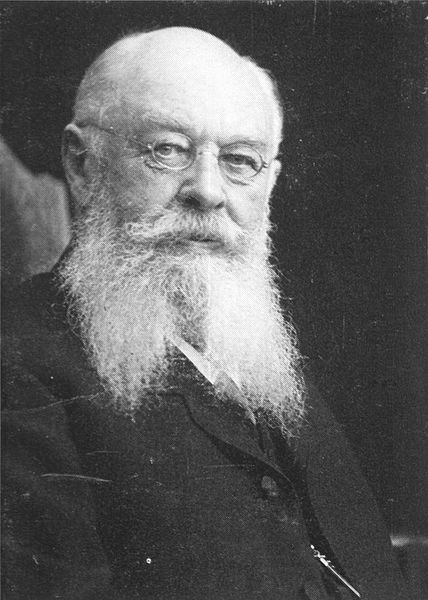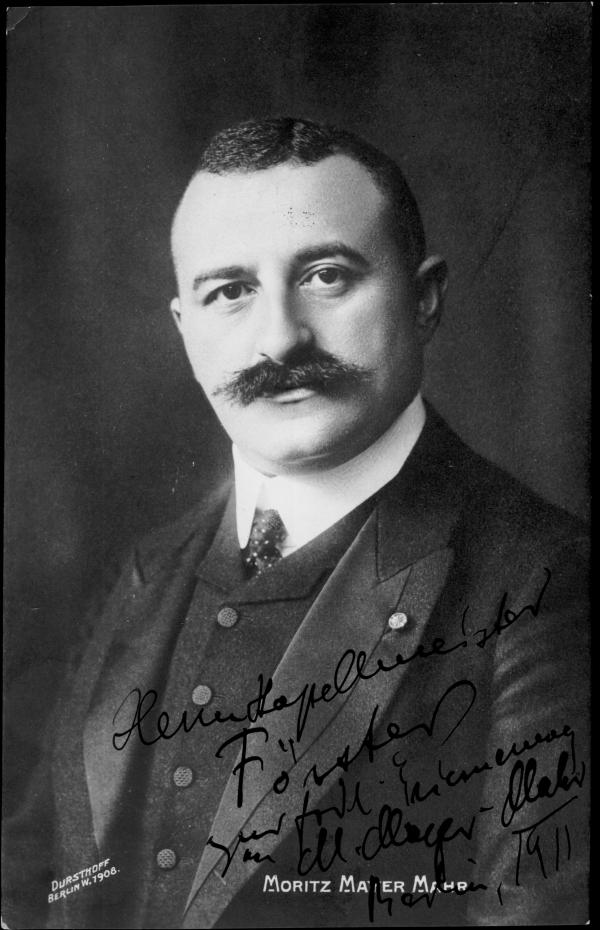|
Heinrich Grünfeld
Heinrich Grünfeld (21 April 1855, Prague – 26 August 1931, Berlin) was a Bohemian-Austrian cellist; a brother of Alfred Grünfeld. He published his autobiography, 'In Dur und Moll' in 1923, an historically important source for Brahms, Joachim, and Richard Strauss. Early life Heinrich Grünfeld was born into an affluent Jewish family in Prague, the son of merchant Moritz Grünfeld (1817, Kolín – 1882, Vienna) and his wife Regina, née Pick (1826, Dobruška – 1881, Vienna). After the discovery of his elder brother Alfred’s musical talent, the family home became a key part of Prague’s music scene. Grünfeld thus became acquainted with many of the prominent Czech musicians of the time, including Bedřich Smetana, Antonín Dvořák and David Popper, with the latter of whom he became close friends. Popper later dedicated two Spanish dances to Grünfeld. Grünfeld studied the cello from the age of fourteen, first with Alois Neruda and then with Frantisek Hegenbarth at the Pr ... [...More Info...] [...Related Items...] OR: [Wikipedia] [Google] [Baidu] |
Émile Sauret
Émile Sauret (22 May 1852 – 12 February 1920) was a French violinist and composer. Sauret wrote over 100 violin pieces, including a famous cadenza for the first movement of Niccolò Paganini's First Violin Concerto, and the "Gradus ad Parnassum" (1894). Biography Sauret was born in Dun-le-Roi in 1852. He began studying violin at the Conservatoire de Strasbourg at the age of six, and with a reputation as child prodigy he began performing two years later. He studied under Charles Auguste de Bériot and later became a student of Henri Vieuxtemps and Henryk Wieniawski. Aged 18, he started studying composition as a pupil of Salomon Jadassohn at the Leipzig Conservatory, where he struck up many friendships. Among these were Fritz Steinbach and Richard Sahla, a child prodigy like Sauret himself. Sauret played in the most famous concert halls of his time. He made his American debut in 1872. Franz Liszt performed sonatas with him. In 1873, Sauret married Teresa Carreño, a ... [...More Info...] [...Related Items...] OR: [Wikipedia] [Google] [Baidu] |
1855 Births
Events January–March * January 1 – Ottawa, Ontario, is incorporated as a city. * January 5 – Ramón Castilla begins his third term as President of Peru. * January 23 ** The first bridge over the Mississippi River opens in modern-day Minneapolis, a predecessor of the Father Louis Hennepin Bridge. ** The 8.2–8.3 Wairarapa earthquake claims between five and nine lives near the Cook Strait area of New Zealand. * January 26 – The Point No Point Treaty is signed in the Washington Territory. * January 27 – The Panama Railway becomes the first railroad to connect the Atlantic and Pacific Oceans. * January 29 – Lord Aberdeen resigns as Prime Minister of the United Kingdom, over the management of the Crimean War. * February 5 – Lord Palmerston becomes Prime Minister of the United Kingdom. * February 11 – Kassa Hailu is crowned Tewodros II, Emperor of Ethiopia. * February 12 – Michigan State University (the "pioneer" l ... [...More Info...] [...Related Items...] OR: [Wikipedia] [Google] [Baidu] |
Biographical Dictionary Of Music And Musicians
A biography, or simply bio, is a detailed description of a person's life. It involves more than just the basic facts like education, work, relationships, and death; it portrays a person's experience of these life events. Unlike a profile or curriculum vitae (résumé), a biography presents a subject's life story, highlighting various aspects of their life, including intimate details of experience, and may include an analysis of the subject's personality. Biographical works are usually non-fiction, but fiction can also be used to portray a person's life. One in-depth form of biographical coverage is called legacy writing. Works in diverse media, from literature to film, form the genre known as biography. An authorized biography is written with the permission, cooperation, and at times, participation of a subject or a subject's heirs. An autobiography is written by the person themselves, sometimes with the assistance of a collaborator or ghostwriter. History At first, biogr ... [...More Info...] [...Related Items...] OR: [Wikipedia] [Google] [Baidu] |
Theodore Baker
Theodore Baker (June 3, 1851"Passed Away," ''Musical America'' (Nov. 10, 1934), p. 32."Dr. Theodore Baker," ''Musical Courier'' (Nov. 3, 1934), p. 20. – October 12, 1934)"Theodore Baker," ''Reports of Deaths of Americans Abroad, 1835-1974'' (death certificate) available through Ancestry.com (access by subscription). Most biographical entries in reference works provide his death date incorrectly as October 13. was an American . Biography Born in |
Hugo Riemann
Karl Wilhelm Julius Hugo Riemann (18 July 1849 – 10 July 1919) was a German musicologist and composer who was among the founders of modern musicology. The leading European music scholar of his time, he was active and influential as both a music theorist and music historian. Many of his contributions are now termed as Riemannian theory, a variety of related ideas on many aspects of music theory. Biography Riemann was born at Grossmehlra, Schwarzburg-Sondershausen. His first musical training came from his father Robert Riemann, a land owner, bailiff and, to judge from locally surviving listings of his songs and choral works, an active music enthusiast. Hugo Riemann was educated by Heinrich Frankenberger, the Sondershausen Choir Master, in Music theory. He was taught the piano by August Barthel and Theodor Ratzenberger (who had once studied under Liszt). He studied law, and finally philosophy and history at Berlin and Tübingen. After participating in the Franco-Prussian ... [...More Info...] [...Related Items...] OR: [Wikipedia] [Google] [Baidu] |
Joseph Sohn
Joseph is a common male given name, derived from the Hebrew Yosef (יוֹסֵף). "Joseph" is used, along with "Josef", mostly in English, French and partially German languages. This spelling is also found as a variant in the languages of the modern-day Nordic countries. In Portuguese language, Portuguese and Spanish language, Spanish, the name is "José". In Arabic, including in the Quran, the name is spelled ''Yusuf, Yūsuf''. In Persian language, Persian, the name is "Yousef". The name has enjoyed significant popularity in its many forms in numerous countries, and ''Joseph'' was one of the two names, along with ''Robert'', to have remained in the top 10 boys' names list in the US from 1925 to 1972. It is especially common in contemporary Israel, as either "Yossi" or "Yossef", and in Italy, where the name "Giuseppe" was the most common male name in the 20th century. In the first century CE, Joseph was the second most popular male name for Palestine Jews. In the Book of Genes ... [...More Info...] [...Related Items...] OR: [Wikipedia] [Google] [Baidu] |
Isidore Singer
Isidore Singer (10 November 1859 – 20 February 1939) was an American encyclopedist and editor of ''The Jewish Encyclopedia'' and founder of the American League for the Rights of Man. Biography Singer was born in 1859 in Weisskirchen, Moravia, in the Austrian Empire. He studied at the University of Vienna and the Humboldt University of Berlin, receiving his Ph.D. in 1884. France After editing the ''Allgemeine oesterreichische Literaturzeitung'' (Austrian literary newspaper) from 1885 to 1886, he became literary secretary to the French ambassador in Vienna. From 1887, he worked in Paris in the press bureau of the French foreign office and was active in the campaign on behalf of Alfred Dreyfus. In 1893 he founded a short-lived biweekly called ''La Vraie Parole'' as a foil to the anti-Jewish ''La Libre Parole''. New York Singer moved to New York City in 1895 where he learned English and taught French, raising the money for the ''Jewish Encyclopedia'' he had envisioned ... [...More Info...] [...Related Items...] OR: [Wikipedia] [Google] [Baidu] |
Richard Andree
Richard Andree (26 February 1835 – 22 February 1912) was a German geographer and cartographer, noted for devoting himself especially to ethnographic studies. He wrote numerous books on this subject, dealing notably with the races of his own country, while an important general work was ''Ethnographische Parallelen und Vergleiche'' (Stuttgart, 1878). Biography Andree was born in Braunschweig, the son of geographer Karl Andree (1808–1875). He followed in the footsteps of his father, studied natural sciences at the Braunschweig Collegium Carolinum and Leipzig University, and temporarily worked in a Bohemian ironworks. As a director of the geography bureau of publisher Velhagen & Klasing in Leipzig from 1873 to 1890, he also took up cartography, having a chief share in the production of the ''Physikalisch-Statistischer Atlas des Deutschen Reichs'' (together with Oscar Peschel, Leipzig, 1877) and the ''Allgemeiner Historischer Handatlas'', (with Gustav Droysen, son of Johann Gu ... [...More Info...] [...Related Items...] OR: [Wikipedia] [Google] [Baidu] |
Moritz Mayer-Mahr
Moritz Mayer-Mahr (17 January 1869 – 30 July 1947) was a German pianist and music educator. Life Born in Mannheim, Mayer-Mahr was the youngest of five children of the merchant Michael Mayer-Mahr and his wife Clara ''née'' Rice(s). Already as a pupil he received piano lessons. From 1886 to 1890, he studied musical composition with Woldemar Bargiel and piano with Ernst Rudorff at the Academy of Arts, Berlin. Mayer-Mahr undertook concert tours and performed as a soloist, in a duo with Willy Burmester and in a trio with cellist Heinrich Grünfeld and violinist Bernhard Dessau, who was succeeded by Alfred Wittenberg after his death in 1923. He admired Ferruccio Busoni, whom he knew personally. Between 1910 and 1930 he recorded a series of pieces by Franz Liszt, Frédéric Chopin and others. His late recordings, however, were viewed sceptically. From 1892, Mayer-Mahr taught at the Klindworth-Scharwenka Conservatory in Berlin. Among his students were in particular Manfred G ... [...More Info...] [...Related Items...] OR: [Wikipedia] [Google] [Baidu] |
Alfred Wittenberg
Alfred Wittenberg (14 January 1880 – 18 July 1952) was a German violinist, pianist and music educator. Life Born in Breslau, Wittenberg was born into a Jewish family. As a wunderkind, the ten-year-old performed in a concert with a violin concerto by Mendelssohn and a piano concerto by Chopin. He studied at the Berlin University of the Arts with Joseph Joachim. In 1901, he received the Felix Mendelssohn Bartholdy Prize (with a scholarship) for violin. He played in the Staatskapelle Berlin of the Staatsoper Unter den Linden in Berlin. As a violinist, Wittenberg was a member of piano trios with Frederic Lamond and Joseph Malkin, with Anton Hekking and Artur Schnabel (later Clarence Adler) and with Heinrich Grünfeld and Moritz Mayer-Mahr. In 1921, John Fernström studied with him. After the Machtergreifung by the Nazis, Wittenberg lived in Dresden, where the Jüdischer Kulturbund organised numerous musical activities. Wittenberg founded a piano trio there with Walter Go ... [...More Info...] [...Related Items...] OR: [Wikipedia] [Google] [Baidu] |



.jpg)

